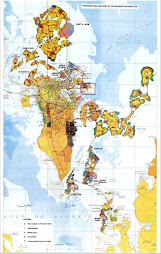19 Convicted in Killing Despite Earlier Acquittal, Lack of Evidence, Coerced Confessions
(New York) - A Bahrain appellate court's March 28, 2010 conviction of 19 men on charges of murder and attempted murder badly undermines the government's claim that it does not tolerate torture, Human Rights Watch said today.
The government had appealed an October 2009 lower court ruling that acquitted the 19 because of the apparent coercion of their confessions and the absence of any other evidence linking the suspects to the death of a security officer. The appellate court made its ruling despite a report by government doctors that found most of the accused men had injuries consistent with their accounts of abusive interrogation techniques.
"This appeals court decision flies in the face of Bahrain's claim that it has a policy of zero tolerance of torture during interrogation of criminal suspects," said Joe Stork, deputy Middle East director at Human Rights Watch. "The government hasn't offered a single shred of evidence linking the defendants to the incident other than these thoroughly discredited confessions."
The case arose from confrontations between demonstrators and security forces in the village of Karzakan in April 2008, which left an unmarked police vehicle ablaze and resulted in the death of a plainclothes officer, Majid Asghar Ali, a Pakistani working for Bahrain's Interior Ministry. The Public Prosecution Office said that 17 of the 19 defendants voluntarily confessed to their roles in the incident and implicated the other two. The 17 subsequently recanted their confessions in court, claiming that they had been tortured and coerced into confessing.
Human Rights Watch issued a report in Manama on February 8 documenting the repeated use of painful physical coercion by Bahrain security officers to secure confessions.
On the basis of the torture allegations, the lower court ordered Health Ministry doctors to examine the defendants. The examinations took place in July 2008. In September, the Health Ministry physicians provided a report to the court detailing their findings regarding 28 defendants (the 19 defendants involved in this case and 9 others in a case arising out of a separate incident in Karzakan). The medical report found, among other things, that:
- 17 of the 28 had scars, bruises or both;
- Five had scars or bruises on their wrists caused by "handcuffing this area or being hung from the ceiling as most suspects testify;" and
- The other scars and bruises could have "resulted from beating."
On October 13, 2009, the lower court, whose presiding judge was a member of Bahrain's ruling Al Khalifa family, dismissed all charges against the 19 defendants. In explaining the acquittal, the court cited the medical report's conclusion that the defendants had "bruises on their wrists, which [they] said are because of hanging from the ceiling" and that the defendants had other "bruises and traces of wounds." Because the court "[was] not comfortable with the confessions attributed to the defendants, and [had] doubts that the confessions were voluntary and by their choosing," the judges elected to "annul all confessions." The lower court ruling also noted the absence of other evidence against the defendants.
The Human Rights Watch report released on February 8, "Torture Redux: The Revival of Physical Coercion During Interrogations in Bahrain," detailed abusive interrogation practices by Bahraini security forces between late 2007 and early 2009. "Torture Redux" cited the Health Ministry report regarding the Karzakan defendants and the court's subsequent dismissal of all charges. In response, the Interior Ministry vehemently denied that it tolerates any physical abuse.
The appellate ruling statement that prosecutors, when they conducted the formal questioning of the suspects, observed no evidence of injuries that could be attributed to the abuse they alleged, is inconsistent with earlier Interior Ministry statements. In a written response provided to Human Rights Watch on February 7, the Interior Ministry said that prosecutors had in fact observed wounds on the suspects but that they attributed these to injuries sustained during the violent demonstration rather than any abuse inflicted during interrogation.
The appeals court decision also provides no corroborative evidence linking the defendants to Ali's death. According to the written ruling, Fahd Fadalah, a captain with the Interior Ministry's General Directorate of Criminal Investigations, "testified that his investigations revealed that the mentioned accused set on fire a police car and killed Majid Asghar Ali," but provides no information about the content or any specific findings of Fadalah's investigation. Fadalah is one of five officers named in "Torture Redux" as among those allegedly responsible for physically abusing suspects during interrogation.
The only forensic evidence cited in the appellate ruling identified blood samples from the scene as belonging to the deceased victim and damage to the police vehicle consistent with an attack involving stones and Molotov cocktails. The ruling also cites the testimony of Ammar Mus`ad and Saleh Ali Saleh Mansur, two other police officers who were on the scene at the time of the attack, but does not indicate that either officer was able to identify any of the 19 defendants as having been involved.
The Higher Criminal Appellate Court convicted all 19 defendants, including the two who had refused to confess. The appellate ruling argued that the defendants' complaints of torture were baseless, citing Public Prosecution Office officials' claims that they had not observed any injuries to the defendants when they questioned them in the days immediately following their arrest. The appellate ruling also said that the Health Ministry doctors could not conclude definitively that the defendants had been tortured and that some of the observed wounds predated the original arrests and therefore did not constitute evidence of abuse. The defendants, the appellate court concluded, confessed freely.
"The court's written decision cannot withstand even gentle scrutiny," Stork said. "Our report demonstrated that the Public Prosecution Office is very much part of Bahrain's torture problem, with a clear interest in discrediting the defendants' allegations. The Health Ministry doctors, on the other hand, had no identifiable interest in any particular conclusion."
The doctors did state that they could not definitively conclude that torture had caused the injuries they observed, given that months had passed by the time of their examination, but they also stated that the injuries they observed were consistent with the defendants' accounts of torture.
The notion that the Health Ministry doctors observed old wounds is wrong, Human Rights Watch said. The doctors carefully noted that in two cases the injuries they found were old, but those two cases are not among the 17 in which they found scars or bruises consistent with physical abuse.
Human Rights Watch also said that the court's decision to sentence all 19 defendants to three years' imprisonment for killing a police officer appeared to be political. Article 333 of Bahrain's penal code mandates the death penalty for the murder of "a public servant or an officer entrusted with a public service...." The court made no apparent effort to determine which of the individuals were allegedly responsible for the policeman's death, sentencing them all indiscriminately to three years each.
"These three-year sentences make it apparent that the authorities don't actually believe these individuals killed a policeman," Stork said. "This is a transparently political ruling, and indicates Bahrain is still some distance from having an independent judiciary at all levels."







